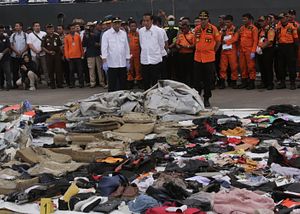Lion Air flight number JT-610 crashed into the sea on October 29, just 13 minutes after taking off from Jakarta en route to Pangkal Pinang, Bangka Belitung island. Two minutes after the Boeing 737 Max 8 plane took off, the captain requested permission from the air traffic controller to return back to the airport. Instead, the plane crashed into the ocean.
There were 189 people on board: 178 adult passengers, and three children (including two infants) as well as eight crew members (two pilots and six cabin crew members). The plane sunk to a depth of 30-40 meters, making it harder for the rescue teams to evacuate the victims.
Brigadier General Bambang Suryo Aji, head of operations for Indonesian national search and rescue agency BASARNAS, suspects that all on board the flight died due to the impact when the plane crashed to the sea. The gloomy prediction also stems from the fact that so far, the rescue team has only found parts of bodies of the victims. Among 24 body bags collected as of this writing, there were no complete bodies. That indicates the airplane experienced a devastating impact.
The plane had experienced some instrument issues just a day before it crashed into Karawang sea. The same airplane had flown from Denpasar to Jakarta with flight number JT-43. Passengers on board JT-43 revealed that the airplane experienced several issues, including trouble starting the engine and a lack of air conditioning, resulting in uncomfortably hot air inside the plane.
According to Pepeng, a passenger on Lion Air flight JT-43, the airplane was flying at a lower altitude than usual. He reported that he could see lights on the ground below from the airplane, while such flights usually fly above the cloud. Another passenger also mentioned that the airplane’s engine made unusual noises.
The plane used for both flight JT-43 and the doomed JT-610 was a brand new Boeing 737 Max 8. The plane first operated on August 15, 2018. Lion Air was the first airline company in Indonesia to use the Boeing 737 Max 8 and ordered 218 units. According to Boeing, the company has sold 4,700 737 Max 8s to companies around the world, including American Airlines, United Airlines, Norwegian Air, and FlyDubai.
In India, a 737 Max 8 with flight number 9W 311 (travelling from Tiruchirappalli to Mumbai) also experienced engine troubles that forced the airplane to stay grounded for 36 hours. This has raised speculation as to faulty manufacturing with the 737 Max 8 line. Boeing shares plunged 6.6 percent on Monday, the worst daily performance since February 2016.
Attention has also focused on the Indonesian airline involved. Lion Air is a low-cost airline runs by Indonesian tycoon, Ruski Kirana, who is also the Indonesian ambassador to Malaysia since May 2017.
Before being appointed ambassador, Kirana worked for the Advisory Council of the President of the Republic of Indonesia. He started his career in politics in 2013 as a politician in the National Awakening Party (PKB). His political advancements indicate that Kirana has a very strong relationship with the Indonesian elite. In Indonesia, it is very common for business leaders to also participate in politics to more easily expand their business.
Lion Air is famous for cheap prices – and infamous for terrible customer service, including lengthy delays, failure to provide information to customers, and unfriendly crews. Rising criticism toward Lion Air’s service, however, did not keep the airline from being among the fastest-growing airline companies in Asia. Indeed, Lion Air dominates the market for air transportation in Indonesia, with 93 routes flown.
Monday’s fatal crash is the third major incident involving a Lion Air flight in 2018 alone. On April 1, Lion Air flight number JT600 from Jakarta to Jambi experienced low air pressure in the cabin, forcing passengers to put on oxygen masks. Late the same month, on April 28, flight number JT 892 from Makassar to Gorontalo slipped from the runway.
The report of the National Transportation Safety Committee (NTSC) of Indonesia into May 2016 collision between two Lion Air planes — an Airbus A330 PK-LEF and Boeing 737-800 PK-LJR — revealed that the culture of the Indonesian airline had contributed to the accident: “The time pressure to arrive at the destination prior to the end of operating hour led to rush situation resulted in mis-judgment while making separation and the wings collided.”
Also in 2016, several Lion Air pilots protested against company management, claiming overseers were ignoring the rights of pilots. Poor time management – including frequent delays – cut into the pilots’ resting time, causing pilots to experience fatigue and impacting their performance.
The crash of Lion Air JT-610 recalls the frightening history of airline crashes in Indonesia. A similar management style was at work in Adam Air, an Indonesia airline company that was forced to close due to several incidents in 2008.
Given this lengthy history of issues in the industry, the Indonesian government should have tightly monitored the safety standards for air transportation and imposed a severe punishment for any company that does not follow relevant regulations. But that is easier said than done. Reform will be hard to implement, as the sector is largely monopolized: banning companies that currently dominate the air transportation market will impact many consumers. Rusdi Kirana himself has admitted that Lion Air might be the worst airplane company in the world, but at the moment there is no alternative for Indonesia.
Nevertheless, airline business is not a matter of profit. As the recent crash proved, mistakes by an airline company take a toll in human lives. The sad fate of JT-610 is a wake-up call for Indonesian authorities and transportation companies to pay full attention to passenger safety.
Asmiati Malik is a political economist based in London and a columnist for Kumparan.































